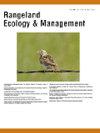评估肯尼亚北部牧民社会网络中的正式和非正式保险方法
IF 2.4
3区 环境科学与生态学
Q2 ECOLOGY
引用次数: 0
摘要
气候冲击,特别是干旱造成的畜牧业资源短缺,使干旱和半干旱地区的牧民陷入贫困并受到不利影响。了解牧民如何应用现有的和现代的风险管理方法,对于脆弱社区的社会保护政策和规划至关重要。因此,本研究试图描述现有的非正式风险分担方法,并探索基于指数的牲畜保险(IBLI)作为牧民应对牧区资源稀缺的正式风险分担方法。本研究以社会生态学和灾害理论为基础,采用定性描述设计。采用半结构化的面对面访谈,从69个家庭受访者、焦点小组讨论和4个关键线人中收集数据。研究发现,尽管社会网络促进了资源共享,但不利的气候压力因素正在扼杀传统的畜牧业资源共享结构。因此,本研究指出,牧民可能从集体分担风险转向以家庭为基础或自我保险。由于认知度低、溢价销售供应放缓以及可信的产品信任赤字,IBLI的使用率低至17%。本研究证实,正规保险可以利用非正规保险社会网络,帮助家庭更好地应对气候冲击,从而增强生计复原力。该研究建议建立一个框架,将传统和现代的风险分担方法结合起来。此外,注重设计适合家庭和集体冲击恢复的正式风险分担产品可能是有希望的。本文章由计算机程序翻译,如有差异,请以英文原文为准。
Appraising Formal and Informal Insurance Approaches Within Pastoralist Social Networks in Northern Kenya
Pastoral resource scarcity resulting from climate shocks, particularly drought, impoverishes and adversely affects pastoralists in arid and semiarid lands. Understanding how pastoralists apply established and contemporary risk management approaches is critical for policy and planning on social protection for vulnerable communities. Hence, this study sought to describe existing informal risk-sharing approaches and explore index-based livestock insurance (IBLI) as a formal risk-sharing approach employed by pastoralists to cope with pastoral resource scarcity. Based on the socioecological and disaster approaches to resilience theory, this research employed a qualitative descriptive design. Using semistructured in-person interviews, data were collected from a sample of 69 household respondents, a focus group discussion, and 4 key informants. This study found that although social networks enhance resource sharing, adverse climate stressors were strangling the traditional resource-sharing structures of pastoralism. As a result, this study noted a potential shift from collective risk sharing to household-based or self-insurance among pastoralists. IBLI uptake was recorded as low at 17% due to low awareness levels, a slowed premium sale supply, and a plausible product trust deficit. This study affirms that formal insurance can leverage informal insurance social networks to assist households in coping better with climate shocks, thus enhancing livelihood resilience. The study recommends establishing a framework that integrates both the traditional and modern approaches to risk sharing. Additionally, a focus on designing formal risk-sharing products that cater to household and collective shock recovery may be promising.
求助全文
通过发布文献求助,成功后即可免费获取论文全文。
去求助
来源期刊

Rangeland Ecology & Management
农林科学-环境科学
CiteScore
4.60
自引率
13.00%
发文量
87
审稿时长
12-24 weeks
期刊介绍:
Rangeland Ecology & Management publishes all topics-including ecology, management, socioeconomic and policy-pertaining to global rangelands. The journal''s mission is to inform academics, ecosystem managers and policy makers of science-based information to promote sound rangeland stewardship. Author submissions are published in five manuscript categories: original research papers, high-profile forum topics, concept syntheses, as well as research and technical notes.
Rangelands represent approximately 50% of the Earth''s land area and provision multiple ecosystem services for large human populations. This expansive and diverse land area functions as coupled human-ecological systems. Knowledge of both social and biophysical system components and their interactions represent the foundation for informed rangeland stewardship. Rangeland Ecology & Management uniquely integrates information from multiple system components to address current and pending challenges confronting global rangelands.
 求助内容:
求助内容: 应助结果提醒方式:
应助结果提醒方式:


